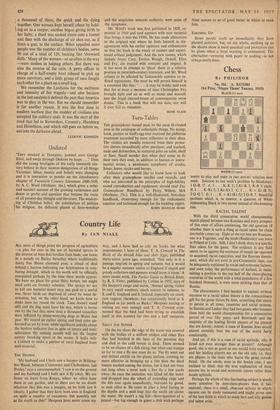Chess
By PHILIDOR Nu. 101. A. BATORI
(1st Prize, 'Magee Theme' Tourney, 1919) BLACK (I I men)
MUTE 1)3 men)
mum to play and mate in two moves: solution next week. Solution to last week's problem by Shinkman: I Q-R 7! A. 1 . . .K-K 3; 2 Kt-K 3, R-R 8 mate.
B.1 ...K-Kt 3; 2 Kt-Kt 3. C. 1 K x Kt (K 5); 2 Q-Q 7. D. 1 . . . K x Kt (Kt 5); 2 Q-R 7. Beautiful problem which is, in essence, a question of White stalemating Black in two moves instead of checkmating him.
RACIAL TALENT With the third consecutive world championship match played between two Russians and every prospect of this state of affairs continuing, the old question of whether there is such a thing as racial talent for chess inevitably comes up. Eight of the ten best are Russians, one is a Yugoslav, and the tenth (Rcshevsky) was born in Poland at Lodz. Still, I don't think there is a specific Slav talent for the game. The evidence in any field seems to be against the existence of innate (as opposed to acquired) racial capacities, and the Russian domin- ance, which did not exist in pre-Communist days, can be adequately explained by social and economic factors; and even today the performance of Iceland, in main- taining a position in the top half of the chess-playing countries of the world with a total population of a few hundred thousand, is even more striking than that of Russia.
The phenomenon 1 find hardest to explain without recourse to a racial talent theory is the extraordinary gift for the game shown by Jews, something that seems to persist in all times, countries and social systems. In Steinitz and Lasker they had two giants who between them held the world championship for a consecutive period of over fifty years—and Botwinnik and the majority of the leading Soviet players of the present day are Jewish; indeed, a team of Russian Jews would almost certainly beat the rest of the world fairly comfortably.
And yet, if this is a case of racial aptitude, why it Israel not even stronger than at present? Although good, she is not as good as one would have expected, and her leading players are on the old side, i.e. they are players in the main who learnt the game outside Israel. On the whole, even in the Jewish case, I ant inclined to think that the true explanation of their success lies in social and economic causes rather than innate aptitude.
Perhaps the whole of this fascinating subject is worth more attention by non-chess-players than it has received; chess is a small, clear-cut activity in which success can be easily measured and might prove one of the best fields in which to study how and why genius and talent arise.


































 Previous page
Previous page